
I'm very thankful to Bellator.






When Tito Ortiz utters the simple yet powerful phrase, “I’m very thankful to Bellator,” his words are not merely those of a fighter acknowledging an organization. They carry the tone of a warrior who has walked long upon the battlefield, endured the trials of time, and found in Bellator a place of refuge, renewal, and dignity. Gratitude, in his voice, becomes a form of honor — a recognition that his journey was not made alone, but was aided by those who gave him opportunity, platform, and respect.
Bellator, to Ortiz, was more than a company. It was an arena that extended its hand to a seasoned gladiator, allowing him to continue writing his story in the cage of combat. In the ancient world, when a soldier or champion had grown older, often he was cast aside, his service forgotten. Yet, here stands Ortiz, acknowledging that Bellator did not discard him, but gave him the chance to fight anew, to prove again his strength and spirit. His thankfulness is thus both personal and symbolic — it is the gratitude of all who are given a second chance to show their worth.
History offers us a mirror to these words. Consider Cato the Elder of Rome, who in his later years still served his Republic, his voice and counsel valued even when his sword arm had weakened. Or recall the tale of Ulysses in the ancient poems, who, though aged, still sought new shores, still yearned to fight and to conquer. Like them, Ortiz found that his story did not end when the world thought it should, for Bellator opened its gates, and he entered once more with courage.
The lesson at the heart of his statement is gratitude. Too often, men and women walk through life with clenched fists, remembering only what was denied to them. Ortiz, though a fierce competitor, shows here the spirit of humility. He recognizes the value of those who supported him, and he speaks thanks aloud. In doing so, he teaches us that even the strongest warriors are not diminished by gratitude; rather, they are ennobled by it.
For the youth and the seekers who listen to these words, learn this truth: the opportunities you are given — whether in sport, in work, or in life — are not owed to you. They are gifts, doors opened by the efforts of others, by the generosity of organizations, mentors, or communities. To show thankfulness is to water the soil that gave you fruit, ensuring that future generations too will taste its sweetness.
And yet, gratitude must not only be spoken; it must be lived. To be thankful is to use the chances granted to you with honor, to rise to the occasion and prove yourself worthy of the trust bestowed. Ortiz did not simply say “thank you”; he fought, he bled, he gave his all inside the cage, showing through his deeds that Bellator’s faith in him was not misplaced. Thus, gratitude becomes not a passive sentiment but an active force, expressed in action, in discipline, in commitment.
Therefore, O listeners, take these words to heart: remember those who opened doors for you, those who gave you a chance when others would not. Speak your thanks, but more importantly, live in such a way that your gratitude is visible through your actions. Like Ortiz, show that you did not squander the gift, but honored it fully. In this, you will not only pay homage to those who aided you, but you will become a light for those who come after, teaching them that thankfulness is both a duty and a crown.
So let this phrase echo through time: “I’m very thankful to Bellator.” In its simplicity lies a profound truth — that no warrior stands alone, and that greatness is made brighter by the humility to acknowledge those who helped you rise.






AAdministratorAdministrator
Welcome, honored guests. Please leave a comment, we will respond soon